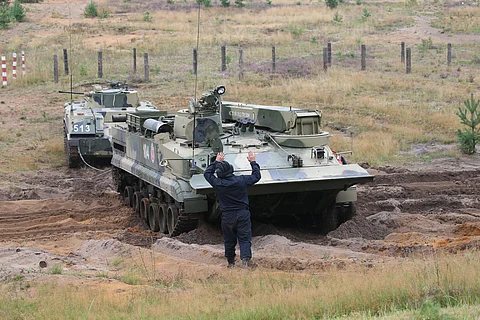

Russian forces have continued their advance into Ukraine’s Dnipropetrovsk Oblast as part of a broader offensive across the entire frontline, signaling sustained momentum in Moscow’s military campaign.
On Saturday, the Russian Ministry of Defense announced the capture of the village of Maliivka, located on the border of the Donetsk region. The seizure marks another step in Russia's intent to penetrate deeper into Dnipropetrovsk. While Russian troops had reached the administrative borders of the oblast back in April, Maliivka is only the second settlement captured—following the fall of Dachnoye last month.
With Maliivka now under Russian control, military analysts suggest the likely next target is the town of Pokrovs’ke, approximately 15 miles (27 kilometers) away. Capturing Pokrovs’ke would enable Russian forces to begin outflanking Ukrainian defenses in the neighboring Zaporizhia region.
The Ukrainian military, already under significant pressure across multiple sectors of the front, is facing an especially dire situation in southern Donetsk. To the north, Russian forces also captured the village of Zelenyi Hai, located in a western panhandle of Donetsk near the border with Dnipropetrovsk, and just northwest of Andriivka-Klevtsove—the westernmost settlement in Donetsk. This gain highlights the extent of the Russian advance: Zelenyi Hai lies over 40 miles (68 kilometers) beyond the original February 2022 frontline and just under 30 miles (45 kilometers) from the city of Kurkove, which fell to Russian forces six months ago.
Despite these advances, the primary Russian objective remains the strategic city of Pokrovsk. On Saturday, reports confirmed that Russian troops had entered the southeastern corner of the city, with the area appearing firmly under their control. Russian reconnaissance and diversionary groups (DRG) were also reported operating deep inside Pokrovsk, targeting Ukrainian logistics routes, while concurrent attacks to the city’s north further threaten to encircle both Pokrovsk and neighboring Mirnograd.
As the battlefield situation worsens for Ukraine, President Volodymyr Zelensky is also facing a growing political crisis. Protests erupted across the country following his controversial move to revoke the independence of two Western-backed anti-corruption agencies. The decision has drawn sharp criticism from both domestic opposition and traditional Western allies. Although Zelensky has signaled a willingness to restore their autonomy through new legislation, Ukraine's parliament (the Verkhovna Rada) is currently in recess until late August—buying the president time to consolidate control and further sideline the agencies in question.